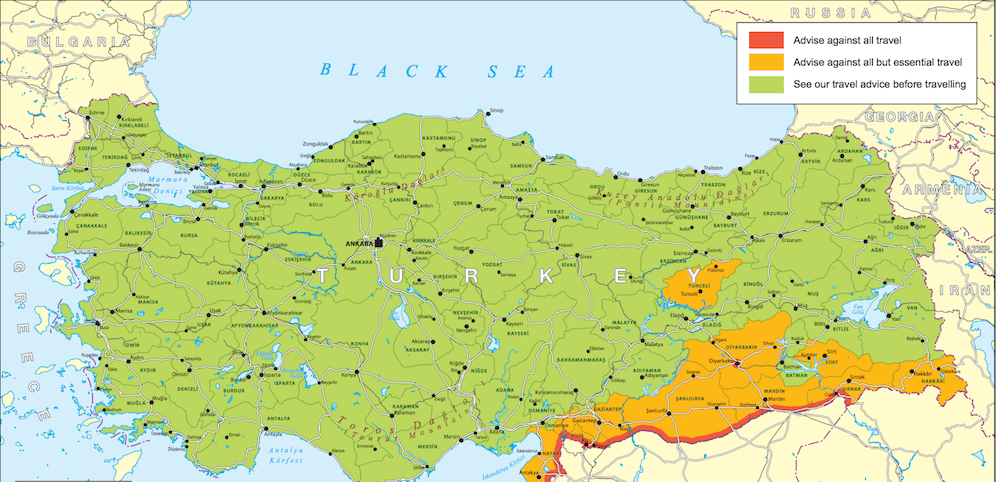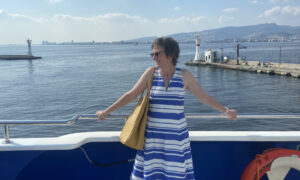The Foreign and Commonwealth Office (FCO) advise against all travel to within 10 km of the border with Syria and to the city of Diyarbakir.
The FCO advise against all but essential travel to:
- the remaining areas of Sirnak, Mardin, Sanliurfa, Gaziantep, Diyarbakir, Kilis and Hatay provinces
- the provinces of Siirt, Tunceli and Hakkari
![FCO 311 - Turkey Travel Advice Ed4 [WEB]](https://dispatcheseurope.com/wp-content/uploads/2017/01/FCO_311_-_Turkey_Travel_Advice_Ed6__WEB_.jpg) On 1 January 2017, there was an attack on the Reina nightclub in Ortakoy, Istanbul, causing a large number of casualties. There is an ongoing police operation in Istanbul as a result of the attack, and the attacker may still be at large. You should exercise vigilance and caution at this time, and follow the advice and instructions of the security authorities.
On 1 January 2017, there was an attack on the Reina nightclub in Ortakoy, Istanbul, causing a large number of casualties. There is an ongoing police operation in Istanbul as a result of the attack, and the attacker may still be at large. You should exercise vigilance and caution at this time, and follow the advice and instructions of the security authorities.
On 17 December 2016, a car bomb exploded in the city of Kayseri, near Cappadocia. 13 people, mostly soldiers, were killed and over 50 people injured.
On 29 October 2016, the US Department of State ordered the departure of family members of employees posted to the US Consulate General in Istanbul due to security information indicating extremist groups continue aggressive efforts to attack US citizens in Istanbul. British diplomatic missions in Turkey continue to operate as normal. You should remain vigilant and monitor travel advice.
British nationals made over 2.4 million visits to Turkey in 2015. It’s generally safe to travel to Turkey, but you should take additional safety precautions. Be alert to your surroundings and remain vigilant in crowded places popular with foreign nationals, including during festival periods such as Christmas and New Year.
Rallies and demonstrations, official and unofficial, may take place at short notice. You should stay well away from any demonstrations.
The situation has calmed following an attempted coup on 15 to 16 July 2016. But the security environment remains potentially volatile and a state of emergency is in place.
In some busy areas, especially Istanbul, the Turkish authorities are stopping members of the public to conduct ID checks. There’s also a larger than usual number of police checkpoints on main roads across Turkey. You should co-operate with officials conducting checks, and keep your passport and a printed copy of your e-visa or your residence permit with you at all times.
Terrorism
There is a high threat from terrorism. Terrorist groups, including Kurdish groups, Daesh (formerly referred to as ISIL) and far left organisations, continue to plan and carry out attacks. Further attacks are likely and could be indiscriminate.
There is a heightened risk of terrorist attack against the aviation industry in Turkey. You should co-operate fully with security officials at airports.
Most terrorist attacks have taken place in the south and east of the country and in Ankara and Istanbul. Attacks are most likely to target the Turkish state, civilians and demonstrations. Nevertheless, it’s likely that some attacks will also target western interests and tourists from western countries, particularly in the major cities.
The Turkish authorities have successfully disrupted attack planning in the recent past and have said that security has been tightened in response to recent attacks. But further attacks are likely and could be indiscriminate.
You should be vigilant, follow the advice of local security authorities, monitor media reports and keep up to date with this travel advice.
See Terrorism.
British nationals need a visa to travel to Turkey, except for cruise ship passengers with ‘British Citizen’ passports who arrive at sea ports for tourist visits to the port city or nearby cities, provided that the visit doesn’t exceed 72 hours.
If you’re visiting Turkey as a tourist or on business, get an e-Visa online before you travel. Only use the official Republic of Turkey e-Visa website. Avoid unauthorised websites as they may charge an additional fee. Some unauthorised websites have issued fake e-Visas.
If you don’t have an e-Visa you can still get a visa on arrival for £20 in cash, although the visa on arrival service is due to be phased out. Getting an e-Visa from the official website before you travel will avoid possible problems or delays at the Turkish border, or when boarding your flight in the UK. See Entry requirements
Take out comprehensive travel and medical insurance before you travel.
If you’re travelling to commemorate the First World War centenary, see this information and advice page to help plan your trip and make sure it’s safe and trouble free.
Many parts of Turkey are subject to earthquakes. An earthquake of magnitude 6.9 occurred on 24 May 2014 in the northern Aegean Sea. SeeNatural disasters














